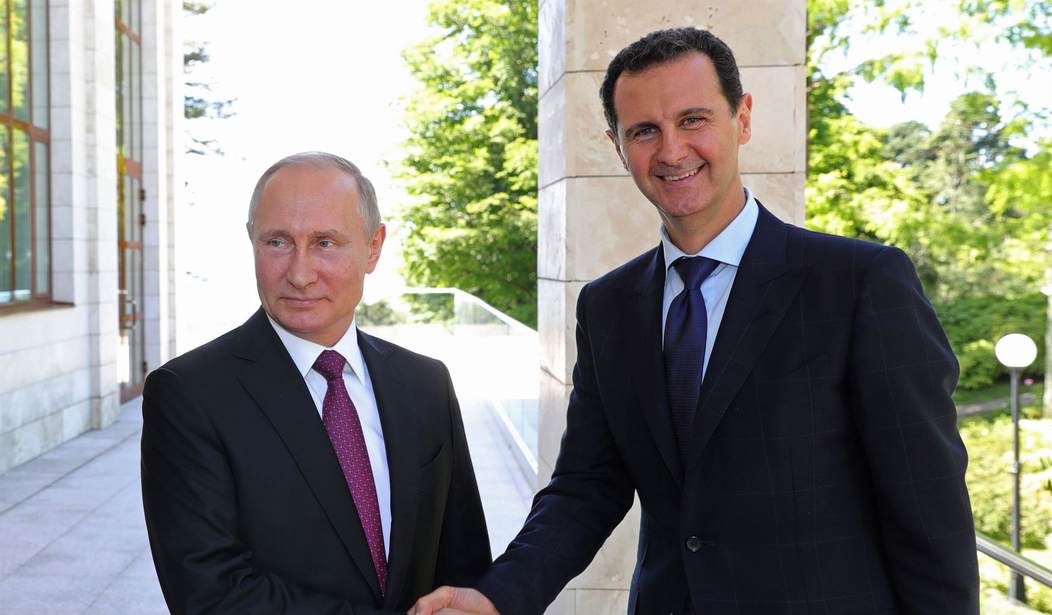The fall of Syria's Bashar al-Assad is the latest and most severe blow to Iran's position in the Middle East. After years of the "shadow war" with Israel, Jerusalem delivered several hammer blows to Iranian proxies Hamas and Hezbollah that have practically destroyed both terrorist organizations.
This created an opportunity for Abu Mohammad al-Jolani and his Hayat Tahrir al-Sham (HST) army to break out of Idlib province and sweep across Southern Syria. The Syrian conscript army melted as the Islamists advanced.
Rumors are flying across the region that Assad was killed in a plane crash. Whether he's alive or dead, he is no longer relevant to the larger picture in Syria and the region.
On Friday, Iran withdrew its military and diplomatic personnel from Syria after seeing the writing on the wall. Abandoning its client Syria will not go over well with Iran's allies and proxies.
The "Axis of Resistance" that Iran was fond of describing included their terrorist allies Hamas and Hezbollah as well as other, smaller Islamist groups in Iraq and Yemen. It has collapsed along with much of Iran's influence in the region.
“For Iran, Syria has been the backbone of our regional presence,” said Hassan Shemshadi, an expert on Iran’s proxy militant groups. “Everything that Iran sent to the region went through Syria. It is now extremely difficult to keep these channels open.”
Initially, the Iranian government was shocked at how quickly the rebels in Syria gained ground and the Syrian Army abandoned its bases, according to three Iranian officials, two of them members of the elite Revolutionary Guards, and two prominent Iranian analysts close to the government.
By midweek, the mood had turned into full panic, the officials said, as the rebels were on a march that would hand them city after city, from Aleppo to Hama to Deir al-Zour and Daraa.
Publicly, Iranian officials vowed to remain fully committed to supporting Mr. al-Assad. But privately, as the rebels gained control over more and more territory where Iran and its proxy militias had reigned, they wondered if events were outpacing their ability to turn the tide, the officials said.
“The potential fall of the Syrian government to Islamist extremists would be one of the most significant events in the history of the Middle East,” Mohammad Ali Abtahi, a former Iranian vice president, said. “Resistance in the region would be left without support. Israel would become the dominant force.”
That's it in a nutshell. The fall of Damascus isolates Iran almost as severely as it was after the revolution in 1979. In addition, Tehran was exposed as a paper tiger, weakening its position further.
“For Iran to enter this fight it would require massive logistical and financial resources,” as well as help from allies and Syria itself, said Mehdi Rahmati, a Syria analyst in Tehran. “None of these conditions exist right now.”
“Syria and Lebanon are like our left and right wings,” Mr. Hemati said. “They are being clipped, and it’s hard to imagine one without the other.”
One thing is certain: The Syrian people aren't sad to see Iran leave. And Donald Trump believes Assad's exit presents a golden opportunity for Russia to sit down with Ukraine to negotiate peace.
"There was no reason for Russia to be there in the first place," Trump wrote. "They lost all interest in Syria because of Ukraine ... a war that should never have started, and could go on forever."
"Assad is gone. He has fled his country. His protector, Russia, Russia, Russia, led by (President) Vladimir Putin, was not interested in protecting him any longer," Trump wrote on Truth Social.
Trump, who takes office on Jan. 20, added that Russia and Iran, Assad's other main backer, "are in a weakened state right now, one because of Ukraine and a bad economy, the other because of Israel and its fighting success."
Trump, who has said he will seek to halt the Ukraine war rapidly, met Ukraine's President Volodymyr Zelenskiy on Saturday in Paris where they were both attending a ceremony to reopen Notre-Dame Cathedral.
He said Russia and Ukraine had both suffered hundreds of thousands of dead and wounded troops, and Ukraine had also lost many civilians. He added the Ukrainian leader "would like to make a deal and stop the madness ... There should be an immediate ceasefire and negotiations should begin."
The loss of Syria is also a blow to the prestige of Putin and Russia. This now creates the conditions for a ceasefire in Ukraine for the first time since the war began. That doesn't mean that Putin will come to the negotiating table. But it's more a possibility now than it was before.










